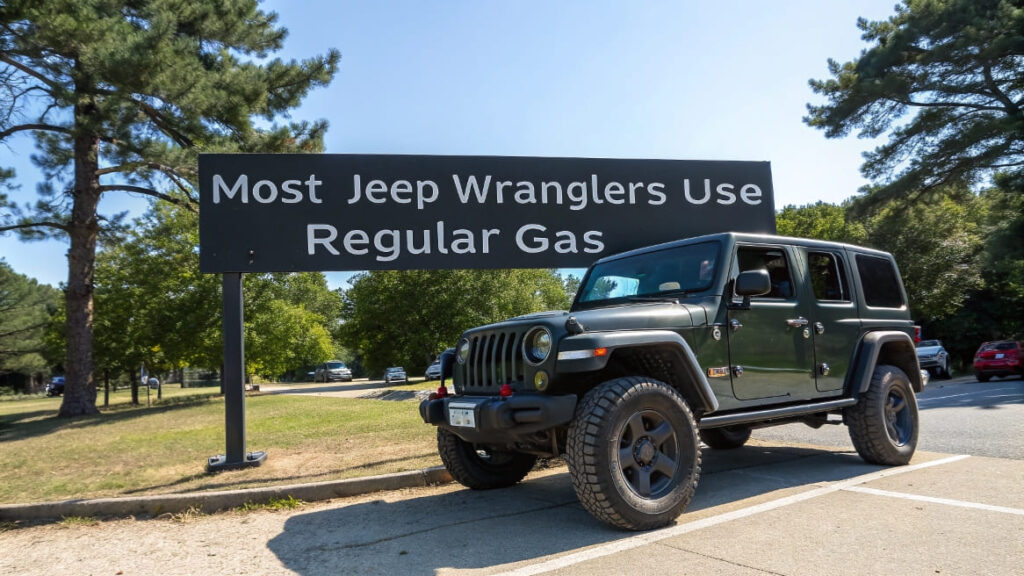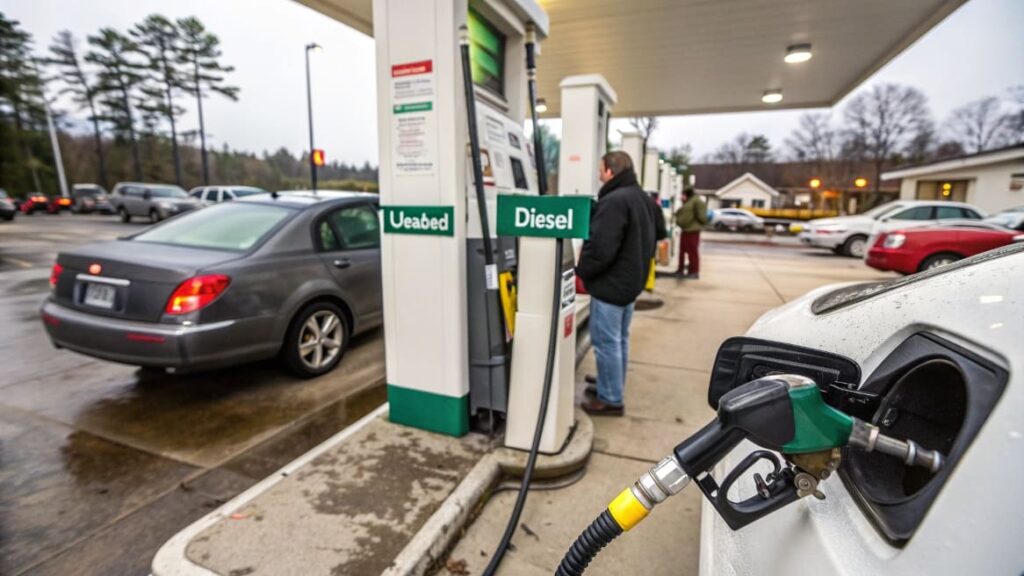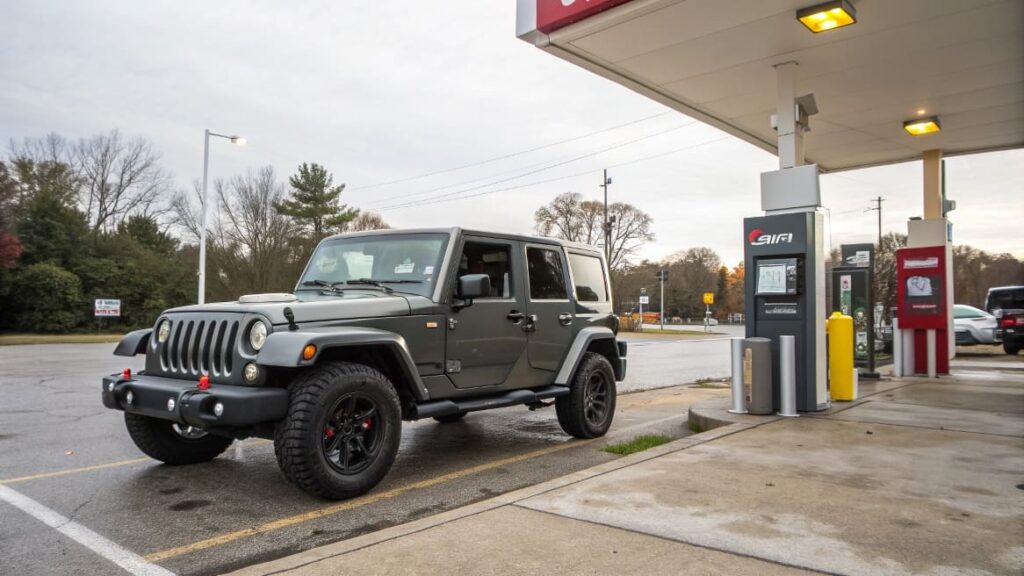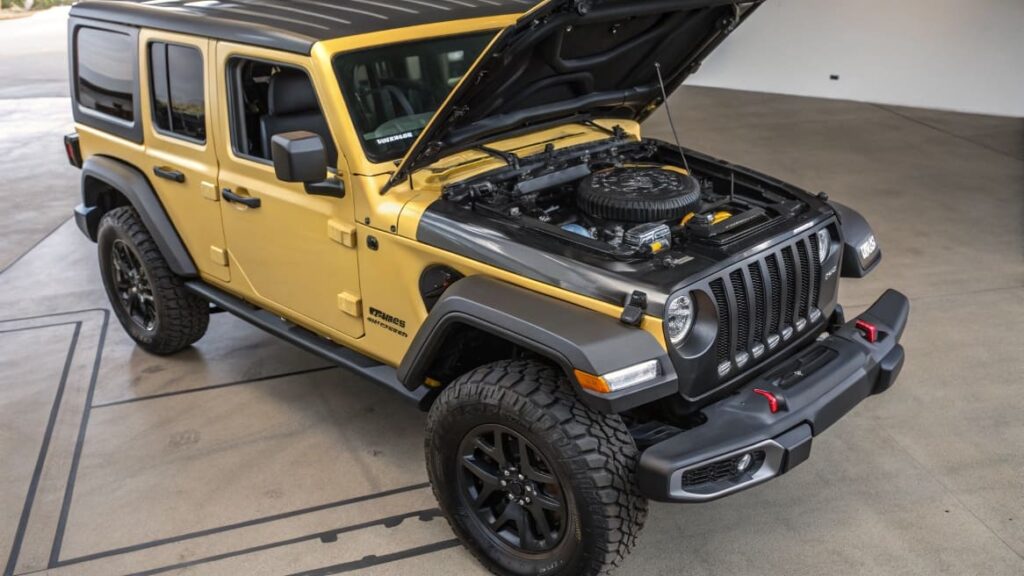Most Jeep Wranglers use regular unleaded gas (87 octane), but some models, especially those with turbocharged engines or V8s, require premium gas (91 octane). Always check your Jeep’s engine type to ensure you’re using the right fuel.
In this article, we’ll explore what type of gas your Jeep Wrangler needs, depending on the engine under the hood. Whether it’s regular unleaded or premium, I’ve got you covered to make fueling up a breeze!
Most Jeep Wranglers use regular gas:
Here’s the quick answer to save you time: Most Jeep Wranglers run perfectly fine on regular unleaded gasoline (87 octane).

But hang on — before you rush to the gas station, it’s good to know that the type of gas your Wrangler needs really depends on which engine you have. Jeep offers a few different engines, and each one has its own little quirks.
So, let’s take a closer look. I’ll make it easy.
Quick and easy chart:
| Engine Type | Recommended Gasoline |
| 3.6L Pentastar V6 | Regular unleaded (87) |
| 2.0L Turbocharged I4 (4-cylinder) | Premium unleaded (91) (recommended) |
| 6.4L V8 (Rubicon 392) | Premium unleaded (91) |
| 2.0L Turbo PHEV (4xe Plug-in Hybrid) | Premium unleaded (91) (recommended) |
| 3.0L EcoDiesel V6 | Ultra-low sulfur diesel |
Okay — now that you’ve seen the quick chart, let’s slow it down and talk about what that really means in normal everyday language.
What Fuel Each Engine Requires:
3.6L V6 (This is the popular one):
Most Jeep Wranglers on the road have this engine. You’re totally good to go with regular gas (87 octane). Nothing fancy. Just fill it up and you’re ready for adventure.
Now, I did check the owner’s manual — and yep, it officially recommends regular gasoline (87 octane). Some folks I know say they notice a teeny bit more pep when they try premium gas (91 octane), but honestly? It’s not required. Regular works just fine, and you’ll save some cash too.
2.0L Turbo (The smaller, turbocharged engine):
This one is a little different. Technically, it can run on regular gas (87 octane), but Jeep recommends premium gas (91 octane) if you want the best performance.
Now you might be wondering — “Do I have to use premium all the time?”
Not really. If you’re just cruising around town, regular gas is okay. But — and here’s the catch — if it’s hot outside or you’re towing something heavy, premium gas helps the turbo engine stay strong and efficient. You’ll get better power and probably better gas mileage too.
Also Read: https://offtoroad.com/are-jeeps-rwd/
6.4L V8 (Rubicon 392):
This engine is a powerhouse. It really needs premium gas (91 octane) to run its best. No shortcuts here — feed it the good stuff so it can flex all that muscle.
4xe Plug-in Hybrid:
Even though it’s part electric, the gas engine in the 4xe also does best with premium gas (91 octane). Again, it’s all about helping that turbocharger do its job smoothly.
3.0L EcoDiesel:
This one’s a whole different story — it runs on diesel fuel, not gas. Specifically, ultra-low sulfur diesel. Make sure you double-check the pump so you don’t accidentally grab the wrong nozzle.
What happens if I use the “wrong” gas?
If you accidentally use the “wrong” gas in your Jeep, don’t panic — but it’s good to know what could happen. Let’s break it down.

Regular Gas in a Premium Engine:
If your Jeep needs premium gas (like in a turbocharged or V8 engine) and you use regular, you might notice the engine feeling a bit sluggish. It could struggle with acceleration and might not perform as well, especially in hot weather or when towing. However, the Jeep’s engine will try to adjust to the lower octane. Over time, though, using regular gas instead of premium could reduce fuel efficiency, and you may even hear some knocking sounds. So, while your Jeep will still run, it’s not ideal for long-term health.
Premium Gas in a Regular Engine:
On the flip side, if you put premium gas in an engine designed for regular gas, like the 3.6L V6, nothing harmful will happen — but it’s a waste of money. Your Jeep’s engine won’t get any extra power or better gas mileage from premium, so you’re just throwing money away without any extra benefit.
Diesel in a Gas Engine:
Now, this is a big no-no. If you accidentally fill up your gas-powered Jeep with diesel, it could cause major damage to the engine. Diesel fuel can mess with the fuel system, and starting the engine could cause costly repairs. If this happens, don’t start the engine — call for help and get the fuel drained as soon as possible.
In a nutshell, it’s all about making sure you use the right gas for your Jeep’s engine. Premium in a regular engine isn’t harmful but is unnecessary. Regular gas in an engine that needs premium could lead to reduced performance over time. And diesel in a gas engine? Definitely avoid that! Always check your owner’s manual or the gas cap to ensure you’re fueling up right.
Check your gas cap or owner’s manual:
One of my simple go-to tricks when something feels off with my car is to check the gas cap or take a look at the owner’s manual. It might sound basic, but you’d be surprised how often a loose or damaged gas cap can trigger that annoying ‘check engine’ light. If the cap isn’t tight enough or has a crack, it can cause a small leak, which is enough to set off the warning. And if that doesn’t do the trick, flipping through the owner’s manual can help clear things up. It’s a quick and easy fix that can save you a lot of time and unnecessary stress!”
What gas do you put in your jeep?
If I had a Jeep, I’d probably be filling it up with the right fuel for the engine. Since you’ve got a Jeep Grand Cherokee L, I know you’ve got that awesome 3.6L V6 engine under the hood. So, for that, you’d be going with regular unleaded gas (87 octane) — nice and easy, just the way it’s designed.
But hey, if I had a Jeep with a turbocharged engine or something like a Wrangler 2.0L turbo, I’d be reaching for premium gas (91 octane) instead. Why? Well, that premium fuel helps boost the engine’s performance and can be especially helpful when it’s really hot outside or when you’re towing.
Basically, it’s all about making sure your Jeep gets the right fuel to keep it running smoothly. I’m sure your Grand Cherokee L is cruising just fine with regular gas, though!
Also Read: https://offtoroad.com/jeep-wrangler-gas-light-how-many-miles/
What Type of Gas Should I Put in My Jeep?
So, you’re at the pump, standing next to your Jeep, and thinking, “What kind of gas should I actually put in this thing?” Don’t worry — we’ve all been there. The good news is, it’s not as complicated as it might seem. Let’s break it down so you can drive off confidently, knowing your Jeep is fueled up just right.
It all depends on what engine you’ve got under the hood!
Jeeps come with different engines, and each one has its own fuel preferences. But don’t stress — I’ll walk you through the options so you know exactly what to use.
If you have the 3.6L V6 engine:
For most Jeep Grand Cherokee L owners (like yourself), if you’ve got the 3.6L V6 engine, you’re going to want to use regular unleaded gas (87 octane). This is your basic, everyday fuel — it’s simple, and it works perfectly for your engine. You won’t need to spend extra on anything fancier.
If you have the 2.0L turbocharged engine or 4xe hybrid:
Now, if your Jeep’s got the 2.0L turbocharged engine (like in the Jeep Wrangler), Jeep recommends using premium gas (91 octane) for the best performance. Here’s the thing, though: you can use regular unleaded (87 octane) in a pinch, but using premium gives your turbo engine a little extra boost — especially when towing or driving in hot weather. It’ll keep things running smoothly and efficiently.
If you’re rocking the 6.4L V8 Rubicon 392:
Okay, now for the serious power. If you’ve got the 6.4L V8 Rubicon 392, your Jeep is built for some serious performance. Premium gas (91 octane) is a must here. This engine’s got the muscle, but it needs the premium fuel to run at its full potential. So, don’t skip on the good stuff.
For the EcoDiesel engine:
And if you’re lucky enough to have the 3.0L EcoDiesel engine, then it’s a whole different ball game. This engine runs on ultra-low sulfur diesel, which is a totally different type of fuel from regular gas. You’ll find it at the diesel pumps, and it’s important to stick to that because regular gas just won’t cut it for the EcoDiesel.
Do All Wranglers Require Premium Unleaded Gas?
I totally get it — you might be asking, “Do all Jeep Wranglers really need premium gas?” It’s a good question! While some people assume that all Wranglers require premium, the answer is actually a bit more specific than that. Let’s dive into the details so you know exactly what your Wrangler needs.
No, not all Wranglers need premium gas.

It depends on the engine under the hood. Let’s break it down:
If your Wrangler has the 3.6L V6 engine:
If you’re driving a Wrangler with the 3.6L V6 engine, you’ll be just fine with regular unleaded gas (87 octane). This is the most common type of gas, and it’s exactly what your engine was designed to run on. No need to spend extra on premium here.
If you have the 2.0L turbocharged engine:
Now, if your Wrangler is equipped with the 2.0L turbocharged engine, Jeep actually recommends using premium unleaded gas (91 octane). While regular gas (87 octane) will work in a pinch, premium gas is the way to go if you want the best performance — especially when towing or if you’re driving in hot weather. It’ll give you that extra boost in power and fuel efficiency.
Other things to keep in mind:
If you have a high-performance Wrangler model (like a Rubicon or the 4xe hybrid), premium gas might be the best choice for keeping your engine running smoothly. These engines are designed for more demanding conditions, so premium gas helps them perform at their best.
What’s the bottom line?
To sum it up:
- If you have the 3.6L V6 engine, regular gas (87 octane) is totally fine.
- If you’ve got the 2.0L turbocharged engine, premium gas (91 octane) is recommended for top-notch performance, but regular gas works too if you’re in a pinch.
- And if you’ve got a high-performance model, like the Rubicon or 4
xe, premium gas is probably the way to go.
It all comes down to the engine — once you know which one you’ve got, fueling up becomes super simple!
Also Read: https://offtoroad.com/how-much-to-paint-a-jeep-wrangler/
What gas do y’all use?
If I had a Jeep, I’d probably go with regular unleaded gas (87 octane), especially if it’s got the 3.6L V6 engine — like the one in your Jeep Grand Cherokee L. It’s the standard, and it works perfectly fine for that kind of engine.
But if I were driving something like a Wrangler with a turbocharged engine, I’d definitely opt for premium gas (91 octane). Why? Well, premium gas gives that extra boost in performance, especially if I’m towing or out on a hotter day. It just helps the engine run smoother and more efficiently.
Which Jeep Wrangler is Best for Gas?
I get it — you’re probably thinking, “Which Jeep Wrangler will save me the most at the pump?” Let’s take a look at the different options so you can make an informed decision.
Jeep Wrangler 4xe (Plug-in Hybrid):
If saving gas is your top priority, then the Jeep Wrangler 4xe is definitely the one to consider. This is Jeep’s plug-in hybrid model, meaning you can drive short distances using just electric power and avoid using gas altogether. How cool is that? When you do need to use gas, the 4xe is still more fuel-efficient than the regular gas engines. It’s a great choice for anyone looking to reduce their fuel costs without sacrificing off-road capability.
Jeep Wrangler with the 2.0L Turbocharged Engine:
Now, if you’re not quite ready to go hybrid but still want something efficient, the 2.0L turbocharged engine is a great option. This engine offers a nice balance of performance and fuel economy. While it’s not as efficient as the 4xe, it still gets better gas mileage than the 3.6L V6 engine. On average, you can expect about 22 mpg city / 24 mpg highway, which is pretty decent for a Wrangler. So, if you want a little more zip while still keeping gas costs in check, this might be the one for you.
Jeep Wrangler with the 3.6L V6 Engine:
Let’s talk about the 3.6L V6 engine, which is the classic engine you’ll find in many Wranglers. It’s got plenty of power for off-roading and towing, but when it comes to fuel efficiency, it’s not the best. You’ll get around 17 mpg city / 23 mpg highway. If you’re using your Wrangler for long drives or more intense off-roading, this engine will do the job, but don’t expect it to save you much at the pump.
Jeep Wrangler with the 3.0L EcoDiesel Engine:

If you’re open to trying diesel, the 3.0L EcoDiesel engine is a great pick. Diesel engines are typically more fuel-efficient than regular gas engines, and this one is no exception. You’ll get around 22 mpg city / 29 mpg highway, which is awesome for a Wrangler, especially if you do a lot of highway driving. Plus, you’ll get extra torque for off-roading and towing. So, if you’re all about that long-distance efficiency, the EcoDiesel might be the way to go.
Which one is the best for gas?
If you’re after the best fuel savings overall, the Wrangler 4xe hybrid is your top contender. It combines electric and gas power for maximum efficiency. But, if you’re not quite ready for hybrid life, the 2.0L turbocharged engine offers a solid middle ground with decent gas mileage and great performance. The 3.6L V6 is more about power than fuel economy, while the EcoDiesel offers great fuel efficiency for those who do a lot of highway driving or need extra towing capability.
FAQ’s
1. Can I use regular gas in a Jeep with a turbocharged engine?
So, here’s the deal: While it’s totally possible to use regular gas in a turbocharged Jeep engine, Jeep actually recommends using premium gas (91 octane) for the best performance. Regular gas will still get you where you need to go, but if you’re towing something heavy or driving in hotter conditions, premium gas helps your turbocharged engine work more efficiently and gives it that extra boost.
2. What happens if I accidentally put the wrong gas in my Jeep?
Oh, trust me — we’ve all been there. If you happen to fill up your Jeep with the wrong gas, like putting regular gas in a car that’s supposed to use premium, don’t worry too much. Your Jeep’s computer will make adjustments, and it’ll still run. However, you might notice a bit of sluggishness or a slight dip in fuel efficiency. So, while it’s okay occasionally, it’s definitely better to stick to the fuel your Jeep is meant to use.
3. Is it okay to use premium gas in a Jeep that recommends regular gas?
Great question! If your Jeep’s engine is designed for regular gas (87 octane), using premium gas (91 octane) won’t really do much for you in terms of power or mileage. You’ll just be spending more at the pump without any extra benefits. If your Jeep calls for regular use, it’s perfectly fine to stick with it, saving you some cash without compromising performance.
4. Do I need to use premium gas for off-roading with my Jeep?
When it comes to off-roading, it all depends on the engine under the hood. If you’ve got a turbocharged Jeep, especially a Wrangler, premium gas (91 octane) will definitely give you a bit more power, which can be helpful in tough terrain or when towing. But if you’re driving a 3.6L V6, you don’t need to worry about premium gas. Regular gas will do the trick, even on those rough trails.
5. Can I switch between regular gas and premium in my Jeep?
You absolutely can switch between regular and premium, but here’s the thing — it’s usually best to stick with what your Jeep’s engine recommends. If your engine is made for premium gas and you opt for regular, you might notice a slight drop in performance or fuel efficiency. But if your Jeep takes regular gas, switching to premium won’t do much for you, so you’re better off saving your money for something else.
Conclusion
To sum it up, choosing the right gas for your Jeep depends on the engine you have. For most Jeeps, regular gas (87 octane) works fine, but turbocharged engines and V8 models need premium gas (91 octane) for the best performance. Always check your owner’s manual or gas cap to be sure, and your Jeep will run smoothly for all your adventures!
Also Read: https://offtoroad.com/jeep-rubicon-gas-type/
Also Read: https://offtoroad.com/how-much-is-it-to-paint-a-jeep-wrangler/
Also Read: https://offtoroad.com/are-jeep-wranglers-good-on-gas/